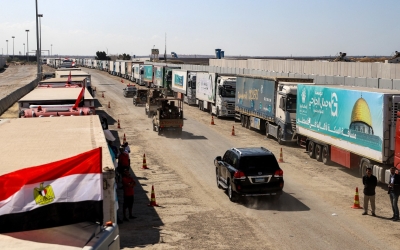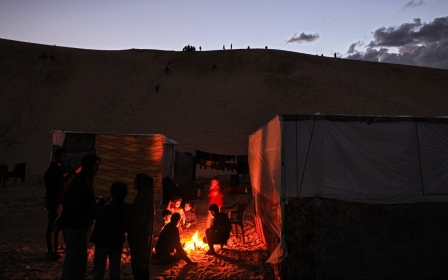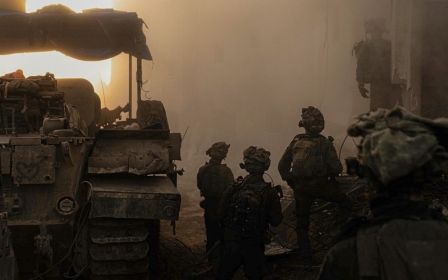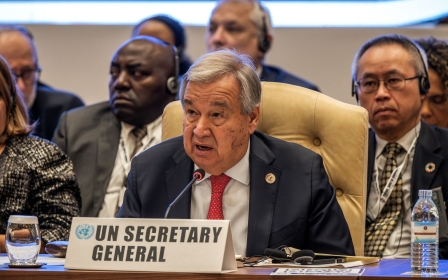Palestinians detained and abused in Israel's 'safe corridor' from Khan Younis
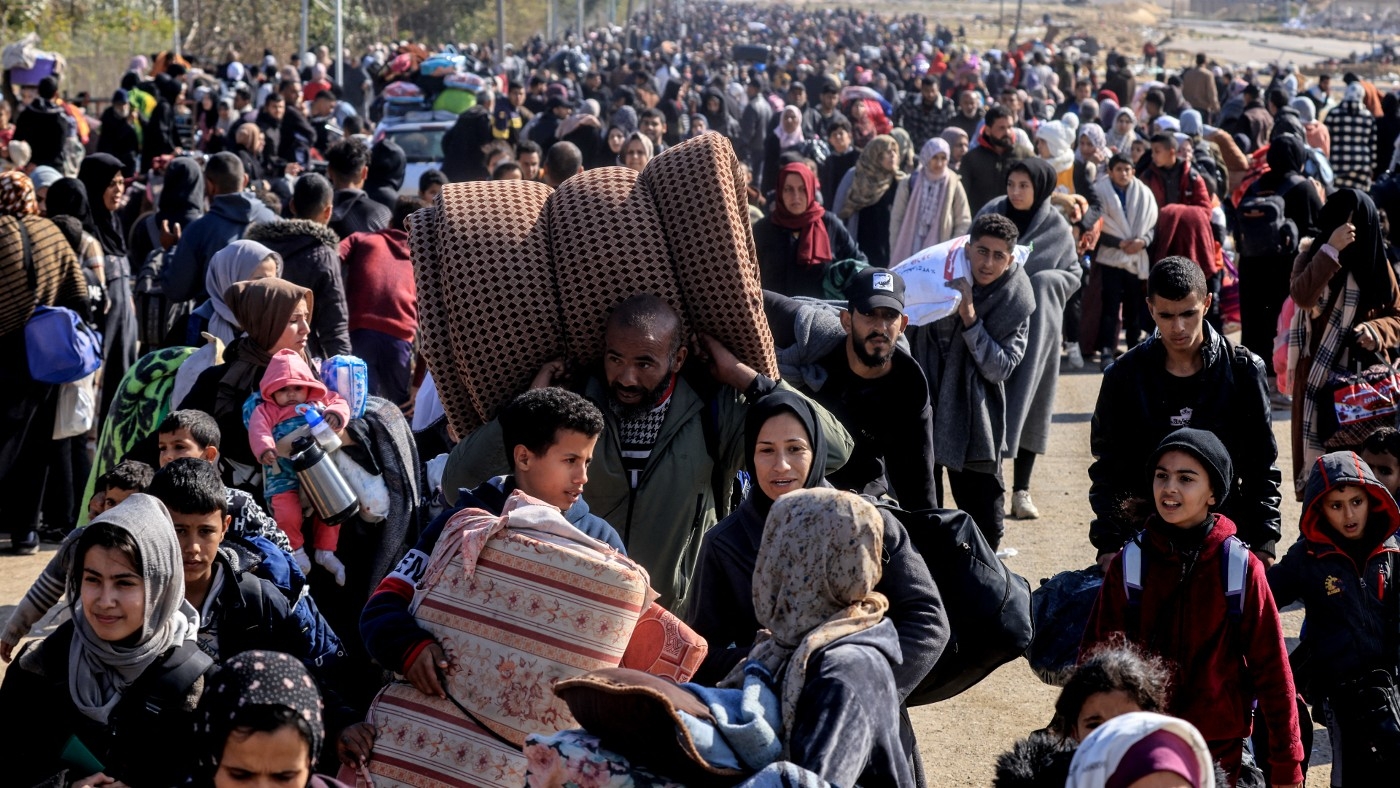
Palestinians fleeing the southern Gazan city of Khan Younis through a supposedly “safe corridor” are being detained, humiliated and sometimes taken away to unknown locations by the Israeli military, according to eyewitnesses who spoke to Middle East Eye.
Early on Saturday morning, the Israeli army ordered civilians remaining in Khan Younis to travel further south to the border town of Rafah and al-Mawasi, an area close by. The military said Palestinians could travel through what it called a “safe corridor”, but scores of civilians have since been detained there.
Israeli forces have set up a checkpoint 200 metres from al-Khair hospital in Khan Younis, in an area known as al-Moaskar al-Garbi. Cameras and microphones have been installed at the checkpoint, with a military zone established behind it housing investigators and an iris-scanning device.
Footage posted online shows armed Israelis standing over a group of Palestinian men dressed in white jumpsuits, sitting cross-legged on the ground in an open area in which an Israeli flag, a military vehicle and a coach can also be seen. The men are blindfolded and have their hands tied behind their back. They are unable to move.
Belal, a 24-year-old from Block 107 in Khan Younis, told MEE that Israeli forces had ordered civilians travelling through the safe corridor to raise their arms, carry their IDs and proceed along a pre-determined route.
New MEE newsletter: Jerusalem Dispatch
Sign up to get the latest insights and analysis on Israel-Palestine, alongside Turkey Unpacked and other MEE newsletters
Civilians, grouped in batches of ten, were searched and questioned by Israeli investigators, and had their iris data recorded at the checkpoint. Some were detained for between two and five hours before being released, while others were put into trucks and taken to detention camps, where they are being held in unknown conditions.
'He is just a child, and his detention appears to be arbitrary. Currently, we do not know his whereabouts or why he was detained'
- Abd Alfatah, Khan Younis resident
According to the Euro-Med Human Rights Monitor in Gaza, Israel is using its “safe corridor” as a “trap to murder and detain Palestinians fleeing Israeli violence”.
Other civilians who had fled south through the corridor told MEE that they had witnessed children and disabled people being detained, as well as deliberate acts of humiliation.
Abd al-Fatah, a resident of block 106 in Khan Younis who is now in Rafah, on Gaza’s border with Egypt, said he and his family had been forced to go through the “safe corridor” to escape Israel’s ongoing bombing.
“They detained my 16-year-old cousin, Ahmed. He passed through the camera with 19 members of our family. Although they released the rest of his family, they singled him out and asked him to stay. He is just a child, and his detention appears to be arbitrary. Currently, we do not know his whereabouts or why he was detained,” he said.
Abd al-Fatah told MEE that the Israeli army did not allow anyone leaving Khan Younis to drive, meaning they had to take the journey by foot. Video footage showed one man pushing his disabled mother in a wheelbarrow.
Disabled civilians detained
Yousuf, 35, a resident of Khan Younis, said that Israeli forces were detaining civilians without taking into account their medical conditions.
“The Israeli forces refused entry to my 40-year-old disabled uncle, Ayman. He, along with two cousins aged 26 and 27, were detained. They were residents of block 108 in Khan Younis but decided to leave following the ground invasion of the city,” Yousuf told MEE.
“We have no idea about the reasons behind their detention. They have not been engaged in any military activities and have no affiliation with any political party - they are purely civilians, like many others who have been detained… They randomly detain people.
"Ayman needs special care - which he is not getting at this moment. He could never pose a threat to the security of Israel."
Muaz, a 35-year-old from Rafah, learned about the detention of his uncle and his 13-year-old son from his uncle's wife, who successfully navigated the corridor along with her daughters.
“My uncle, Suhail, and his 13-year-old son, Abd al-Aziz, were detained while using the safe corridor. How the hell can they detain 13-year-olds? Children should never be targeted. The safe corridor is a deceptive ploy, they lure people there only to detain them.”
Muaz told MEE that another uncle of his, Iyad, had also been detained in the “safe corridor”. The family asked the Red Cross for information about his whereabouts but the organisation was unable to help.
“We do not have high expectations from them anyway,” Muaz said. “Iyad is a doctor. He was wearing medical attire at the time of his detention. Individuals who were released later informed us that Iyad is held under administrative detention in al-Naqab prison.”
The Euro-Med Human Rights Monitor says that Israel's evacuation order lacks a provision for safe shelter, and qualifies as forced displacement, thereby violating international humanitarian law.
Middle East Eye delivers independent and unrivalled coverage and analysis of the Middle East, North Africa and beyond. To learn more about republishing this content and the associated fees, please fill out this form. More about MEE can be found here.


